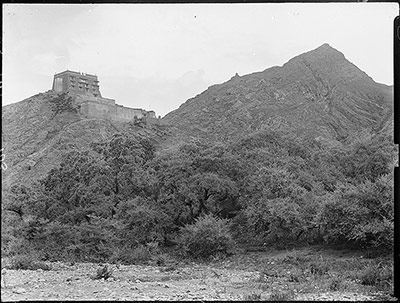
1998.286.114 (Glass negative)


1998.286.114 (Glass negative)

Sir Charles Bell or Rabden?
Sir Charles Bell
August 25th or September 5th 1921
Talung Valley Region > Lhundrub
1998.286.114
78 x 103 mm
Negative Quarter Plate
Donated 1983
St Antony's College, Oxford
Notches on right side
Sir Charles Bell's Mission to Lhasa 1920-21
Q.103
BL.Q.103
British Library, Oriental and India Office Collections
Manual Catalogues - Bell's List of Illustrations entry: "[No. of chapter] XXV. [Subject of Chapter] Travelling [Subject of Illustration] Q103 (x) Lhuntrup Dzong. [Where placed - book page] G.J."
Other Information - Setting: At the end of August 1921 Bell and Kennedy were encouraged to make a tour of the country north of Lhasa. On 25th August they visited Lhuntrup Dzong. Bell's diary entry for that day: "We go today to Lhuntrup Jong, riding across the broad plain, which is intersected by 8 or 9 branches of the Pembo Chu. The current everywhere is swift for the streams are in full flood, flush with the tops of their banks. Our ponies find difficulty in keeping their footing, but we all get over the streams safely, though sometimes a pony puts its foot in a hole, and sinks deep into the swirling water. The plain itself is in many places a quagmire and our ponies sink in it to their knees. At length, however, we reach firmer ground and travel rapidly to our destination, ambling and cantering. Lhun-trup Jong is 8 miles from Lang-Thang. The Jong, which has been recently rebuilt, rests on a spur, some four hundred feet high. We camp on the plain at its foot at an elevation of 12,000 ft." [Diary vol. XII, pp.33-34] [MS 9/8/2004]
Other Information - Setting: "There is another Red Tomb [tomb in which embalmed bodies are laid to rest] at Lhun-trup Dzong, north of the Pem-po Valley, thirty miles from Lhasa. ... The year before our visit a miracle had happened. The people were rebuilding the Dzong , then almost in ruins. Close to it was a cho-ten , enclosing the embalmed body of the mother of him who had re-built Ta-lung Monastery when destroyed by fire. So the priest summoned the local deity after the manner of the Oracles and told him that they were going to repair the cho-ten also. But the answer came, 'Leave it alone'. // Soon afterwards the house, in which the cho-ten was kept, fell down. The cho-ten itself was broken, the corpse was uncovered and went rolling down the hillside, four hundred feet, over and over. When the people went to look at it, they were astonished to find that not only was the corpse uninjured, except for a cut near one of the ankles, but that the flesh on the body was as fresh as during the lady's lifetime. They found, too, that it was pure flesh, and not built up with clay, as is the regular practice. The body was carried up the hill again and is encased now in a fresh cho-ten ." 'The People of Tibet', Bell, C. A., Oxford: Clarendon Press, 1928, pp.296-7
Published in 'A Year in Lhasa' in The Geographical Journal, February,1924, facing p.101:"Lhuntrup Dzong". This piece was derived from a lecture given to the Royal Geographical Society in London on 3rd December 1923 [MS 10/9/2004]
For Citation use:
The Tibet Album.
"Lhundrub Dzong"
05 Dec. 2006. The Pitt Rivers Museum.
<http://tibet.prm.ox.ac.uk/photo_1998.286.114.html>.
For more information about photographic usage or to order prints, please visit the The Pitt Rivers Museum.
© The Pitt Rivers Museum